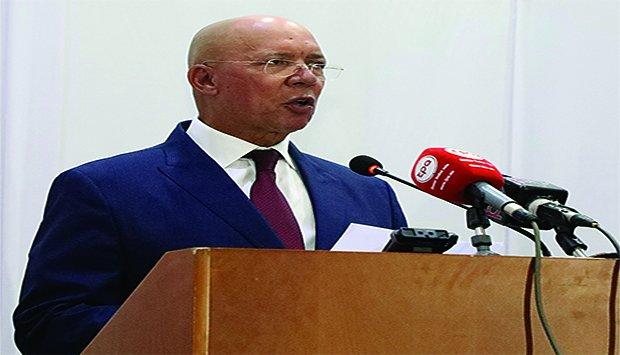Africa-Press – Angola. In the coming months, the country will have 14 integrated justice centers in an equal number of provinces, with registry offices, identification posts and notaries, the Minister of Justice and Human Rights announced on Monday (14).
According to Francisco Queiroz, this measure is intended to improve the conditions of service to the population in that sector.
Speaking at the opening of the 2022-2023 training year, of the National Institute of Judicial Studies (INEJ), the minister also informed that another 14 notary and civil registry structures will be repaired.
He said that the contracting of the best solutions for the computerization of the courts and the entire chain of judicial services is being prepared, reiterating that the reform of justice and law is one of the main ways to achieve the great challenge of the Executive to combat corruption and impunity.
This reform, he explained, is based on four fundamental pillars. The first, legal, involves modernizing the legislation of the judiciary and adapting it to the 2010 Constitution.
The second is based on the reform of the judicial system, with the introduction of District Courts, Rela- tion, Sala do Comércio and guarantee judges, with a view to bringing justice closer to the citizens and granting greater procedural speed to judgments and judicial appeals. The other pillars are the computerization of the judicial system and the training of magistrates and justice officials.
In order to achieve this purpose, Francisco Queiroz recalled that many laws have already been approved with an impact on the judicial system, having highlighted the Penal Code and the Criminal Procedure Code, the Law that updates court costs and defines the jurisdiction of the courts, to which Repristina Rules of the Code of Civil Procedure relating to the appeal procedure for a grievance for the relationship, the Organic Law of the Supreme Court, the Court of Appeal, as well as the Law on Judicial Secretariats and the Law on Popular Action.
In addition, he added, the Executive built important infrastructure to house the bodies
of Justice, which includes the District Courts, the Court of Appeals of Benguela, Huíla and Luanda and the Commercial Room of the District of Luanda.
Significant investments were also made in the justice services, with a view to granting citizenship to all Angolans.
During the opening ceremony, Francisco Queiroz recalled that the beginning of the academic year at INEJ takes place at a time when the end of the current legislature is approaching, inaugurated in September 2017 by the President of the Republic, João Lourenço, whose political agenda is marked by the fight against corruption.
Regarding the training carried out between September 2018 and February 2022, there are a total of 482 actions for judicial magistrates, judges and prosecutors of the Public Ministry, including military magistrates.
The actions, he said, resulted in the training of 347 magistrates, of which 198 for the judiciary and 147 for the Public Ministry. In addition, 209 magistrates were trained to perform the duties of judge of guarantees, of which 128 are judicial magistrates and 81 of the Public Ministry, appointed by the superior councils.
Supreme Court president asks for more humility
For the judge-counselor of the Supreme Court, Joel Leonardo, the Democratic Rule of Law is built with judicial magistrates committed to the expectations of citizens and the people. From these, he added, valences of wisdom and team spirit are expected, common sense, urbanity and, above all, humility in fulfilling the duty of good to serve the Law and the Constitution of the Republic.
Joel Leonardo took the opportunity to challenge the INEJ to reflect on how to add practical modules to the training of auditors, practical modules for the management of legally recovered assets and tactics for mastering the magistrate’s own self-defense techniques.
The also president of the Superior Council of the Judiciary extended the challenge to specific themes related to the protection of the environment and matters to consolidate more practical skills related to the digitalized management of judicial processes.
The Attorney General of the Republic, Hélder Pitta Groz, acknowledged that the levels of scrutiny by society, especially opinion makers, have never been so high. This, he defended, requires an exemplary stance at all levels and true guardians of the highest social morals.
“The challenges facing Angolan justice are immeasurable, so that only through a union and synchronized action of the two judiciaries – the Public Prosecutor’s Office and the Judiciary – is the judicial power fully materialized”, he considered.
What is intended, according to Pitta Groz, is that the INEJ transform jurists into magistrates and provide trainees with the result of decades of dedication to the judiciary and that the number of skills enable them to perform various exercises.
“In a society martyred by difficulties of various kinds, justice performs the primary function of supporting severity and guaranteeing the maintenance of social, peaceful, fruitful and harmonious opinion among all”, he considered.
room for trials
The director of the National Institute of Judicial Studies, Artur Gunza, pointed to the construction of a courtroom as one of the next challenges.
The courtroom, he explained, will not only be for mock trials, but also real ones, as long as there is perfect coordination between the INEJ and the Belas District Court.
“For this, we need to build classrooms with greater capacity and increase the service areas, taking into account the context and the current reality that require it”, he reinforced.
Artur Gunza considered the number of employees to be insufficient to fully respond to all tasks. Indeed, he is awaiting the holding of a public tender to reinforce the team of INEJ technicians, as well as the insertion of about 20 employees on a contract basis.
For More News And Analysis About Angola Follow Africa-Press






